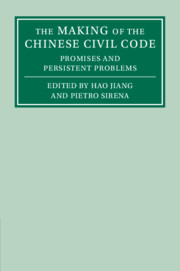Book contents
- The Making of the Chinese Civil Code
- The Making of the Chinese Civil Code
- Copyright page
- Dedication
- Contents
- Tables
- Contributors
- Preface
- Acknowledgements
- Abbreviations
- 1 The Making of a Civil Code in China
- 2 Personality Rights in China’s New Civil Code
- 3 Force Majeure or Change of Circumstances
- 4 Article 580 (2) of the Chinese Civil Code
- 5 Contractual Consent in the New Chinese Civil Code
- 6 The Security Interests in Chinese Law
- 7 Chinese Tort Law in the Era of the Civil Code
- 8 Causation in the Chinese Civil Code
- 9 The Aims of Tort Law across China and the West
- 10 Classifying the Passive Appreciation of Separate Property during Marriage in the Chinese Civil Code
- 11 The Rule of Law in Traditional China
- 12 The Private Law Influence of the Great Qing Code
- 13 The New Validity Rules in Chinese Civil Code and Chinese State-Owned Enterprises’ Freedom in Contracting
- 14 Chinese Civil Law and Soviet Influences
- 15 The Connections between Roman Law and Chinese Civil Law
- Index
7 - Chinese Tort Law in the Era of the Civil Code
Published online by Cambridge University Press: 31 August 2023
- The Making of the Chinese Civil Code
- The Making of the Chinese Civil Code
- Copyright page
- Dedication
- Contents
- Tables
- Contributors
- Preface
- Acknowledgements
- Abbreviations
- 1 The Making of a Civil Code in China
- 2 Personality Rights in China’s New Civil Code
- 3 Force Majeure or Change of Circumstances
- 4 Article 580 (2) of the Chinese Civil Code
- 5 Contractual Consent in the New Chinese Civil Code
- 6 The Security Interests in Chinese Law
- 7 Chinese Tort Law in the Era of the Civil Code
- 8 Causation in the Chinese Civil Code
- 9 The Aims of Tort Law across China and the West
- 10 Classifying the Passive Appreciation of Separate Property during Marriage in the Chinese Civil Code
- 11 The Rule of Law in Traditional China
- 12 The Private Law Influence of the Great Qing Code
- 13 The New Validity Rules in Chinese Civil Code and Chinese State-Owned Enterprises’ Freedom in Contracting
- 14 Chinese Civil Law and Soviet Influences
- 15 The Connections between Roman Law and Chinese Civil Law
- Index
Summary
This chapter considers the socioeconomic functionality of legal codes and codification through the lens of late imperial Chinese legal history. Specifically, it asks whether formal legal codes can wield significant influence over private socioeconomic behavior despite being poorly enforced—or even unenforced—and whether such influence derives, in part, from the symbolic value of codification itself. It argues that the answer to both questions is likely “yes,” at least in the context of Qing Dynasty private law. This contains potentially generalizable insights into the nature of legal authority and prestige, some of which may potentially be applied to the recent passage of the Chinese Civil Code in 2020.
- Type
- Chapter
- Information
- The Making of the Chinese Civil CodePromises and Persistent Problems, pp. 153 - 178Publisher: Cambridge University PressPrint publication year: 2023

